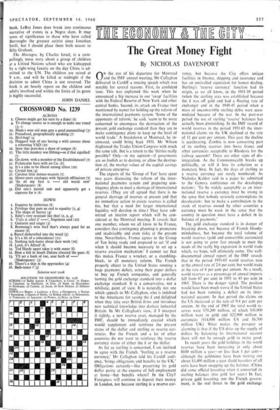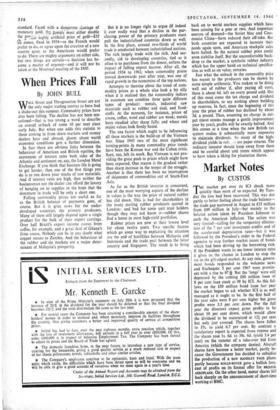The Great Money Fight
ECOKOMV 4CE1-05N--_
By NICHOLAS DAVENPORT
ON the eve of his departure for Montreal j and the IMF annual meeting, Mr Callaghan delivered in Cardiff a rousing speech which was notable for several reasons. First, its confident tone. This was explained this week when he announced a big increase in our 'swap' facilities with the Federal Reserve of New York and other central banks. Second, its attack on France (not mentioned by name) for holding up the reform of the international payments system. 'Some of the opponents of reform,' he said, 'seem to be more concerned to encompass the destruction of the present gold exchange standard than they are to make contingency plans to keep up the level of world trade.' A breakdown at Montreal, he in- sinuated, could bring back 1931. Mr Wilson frightened the Trades Union Congress with much the same talk. But is a return to the 'thirties really possible? Only-in my opinion-if goverments are so foolish as to destroy, or allow the destruc- tion of, the market values of the capital savings of private enterprise.
The experts of the 'Group of Ten' have spent two years discussing the reform of the inter- national payments system and preparing con- tingency plans to meet a shortage of international reserves. (They are all agreed that there is no general shortage of reserves at present and that no immediate action to create reserves is called for, but that a need for larger international liquidity will develop in time.) They have sub- mitted an interim report which will be con- sidered at the Montreal meeting. It reveals that one member, whom we all know to be France, considers that contingency planning is premature and inadvisable and even risky at the present time. Nevertheless, France agrees to the Group of Ten being ready and prepared to act 'if and when it should become necessary to set up a reserve creation mechanism.' I cannot see that this makes France a wrecker, or a stumbling- block, to all monetary reform. The French properly object to the United States running a huge payments deficit, using their paper dollars to buy up French companies, and generally turning the gold exchange standard into a dollar exchange standard. It is a conservative, not a nihilistic, point of view. It is naturally not one which appeals to Mr Callaghan, who is indebted to the Americans for saving the £ and delighted when they take over British firms and introduce new technical knowledge into darkest industrial Britain. In Mr Callaghan's view, if I interpret it rightly, a new reserve asset, managed by the IMF, should be immediately created which would supplement and reinforce the present status of the dollar and sterling as reserve cur- rencies. But the French and a lot of other countries do not want to reinforce the reserve currency status of either the £ or the dollar.
As far as sterling is concerned, I am inclined to agree with the French. 'Sterling as a reserve currency,' Mr Callaghan told his Cardiff audi- ence, 'brings obligations and benefits to the UK.' Obligations certainly-like preserving its gold dollar parity at the expense of full employment at home-but benefits where? In the City? Foreigners will continue to deposit their money in London, not because sterling is a reserve cur- rency, but because the City offers unique facilities in finance, shipping and insurance and has an unrivalled reputation for honest dealing. Sterling's 'reserve currency' function had its origin, as we all know, in the 1931-39 period (when the sterling area was established because the f was off gold and had a floating rate of exchange) and in the 1940-45 period when a mass of unconvertible sterling debts were accu- mulated because of the war. In the post-war period the use of sterling 'reserve' balances has actually been diminishing. In the IMF record of world reserves in the period 1951-65 the inter- national claims on the UK declined at the rate of per cent per annum. This year the decline is accelerating. Zambia is now converting part of its sterling reserves into Swiss francs and other currencies acceptable to Rhodesia for the railway account! There are other signs of dis- integration. As the Commonwealth breaks up politically, so will it lose its cohesion as a monetary bloc. In fact, the days of sterling as a reserve currency are surely numbered. As Nicholas Kaldor said in a paper he submitted to the Geneva conference on the developing nations : `To be widely acceptable as an inter- national reserve a currency must be strong in the sense that nobody seriously contemplates its devaluation: but to make a contribution to the stock of reserves owned by other countries a currency must be weak in the sense that the country in question must have a deficit in its balance of payments.'
The gold exchange standard is in danger of breaking down, not because of French bloody- mindedness, but because the total volume of world reserves (gold and convertible currencies) is not going to grow fast enough to meet the needs of the really big expansion in world trade which, we hope, will ultimately come. The well- documented annual report of the IMF reveals that in the period 1951-65 world reserves rose at the annual rate of 2.6 per cent, but world trade at the rate of 6 per cent per annum. As a result, world reserves as a percentage of annual imports fell from 67 per cent in 1951 to 43 per cent in t_ 1965. There is the danger signal. The position would have been much worse if the United States had not been running a deficit on its inter- national account. In that period the claims on the US increased at the rate of 9.4 per cent per annum. At the end of 1965 the total world re- serves were $70,200 million, of which $41,900 million were in gold and $22,900 million in currencies (S14,800 million US and $6,700 million UK). What makes the prospect so alarming is that if the US dries up the supply of dollars by balancing its international account there will not be enough -gold to make good.
In recent years the gold holdings in the world reserves have been increasing at only about $600 million a year-or less than 1 per cent- although the goldmines have been turning out about $1,400 million a year. Gold hoarders of all sorts have been snapping up the balance. (China did some official hoarding when it converted its sterling balances into gold last year.) In fact, private gold hoarding, not the French govern- ment, is the real threat to the gold exchange standard. Faced with a dangerous shortage of monetary gold, the powers -must either double the pre.:an ighly artificial price of gold—$35 an ounce, fixed in 1934—as the French would prefer to do, or agree upon the creation of a new reserve asset, as the Americans would prefer to do. There are mighty arguments on either side, but two things are certain—a decision has be- come a matter of urgency—and it will not be taken at the Montreal meeting of the IMF.



































 Previous page
Previous page